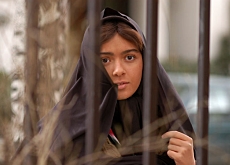
Locarno holds up a mirror to the Middle East

Films from Israel, the Palestinian territories and Iran have all received enthusiastic receptions at the 59th International Film Festival in Locarno.
The screenings come at a difficult time for the Middle East, with fighting continuing in Lebanon, ongoing tensions over Iran’s nuclear programme and Israeli operations in the Gaza Strip.
The movies – some from the Leopards of Tomorrow short film section – dealt with familiar themes such as discrimination, trust and mutual (mis)understanding.
More than 100 personalities from the Swiss film world called in Locarno on Monday for an immediate ceasefire to end the violence in the Middle East.
In their public appeal, they accused Israel of being a “criminal state” but welcomed the efforts by Israeli filmmakers “who had the courage to stand up and protest against the brutal military operation in Lebanon and Palestine”.
Israeli director Leon Prudovsky, who was in Locarno with his powerful short film Dark Night, told swissinfo the situation was “problematic and tough” but declined further comment.
Swiss President Moritz Leuenberger had in his opening address at Locarno said: “What other hope do we have in the Middle East conflict other than dialogue? None.”
Middle Eastern directors certainly believe they have something to say in current circumstances.
“I think people – not only filmmakers but also individuals who care for humanity – should stand up and stop following bullies around,” Sameh Zoabi, a Palestinian director, told swissinfo.
“I appreciate anyone who thinks they have something to say and contributes to the issues and stands by their principles.”
European role
Zoabi’s 19-minute film, Be Quiet, is a potholed road movie about the political and familial tensions faced by a Palestinian father and son driving home through Israeli military roadblocks.
“It’s the idea of growing up a Palestinian inside Israel and being considered a second-class citizen and having to deal with discrimination but also with fear,” he said.
Prudovsky’s excellent 30-minute Dark Night follows two Israeli soldiers whose bad day – hit by a mine in a Palestinian area, they hide with a Palestinian couple whom they have taken hostage – gets worse when the wife goes into labour.
Zoabi agreed with Prudovsky that financing is probably the hardest part of filmmaking in the Middle East – “it doesn’t matter whether you’re Palestinian or German, it’s a major issue for everyone” – and that European film festivals such as Locarno are vital.
“When there’s outside recognition suddenly your own community gets interested in you,” Zoabi said.
“A lot of people [in the Palestinian territories] are struggling just to live under the [Israeli] occupation, so they don’t have any cinema education. It’s hard for us to sustain acknowledgement from them.”
Cover-up
The Iranian film Fireworks Wednesday, the only Middle Eastern film up for the Golden Leopard on Saturday, received an excellent reception.
Director Asghar Farhadi played it straight cinematically and the film – a kitchen sink drama about marital fidelity and trust – could have taken place anywhere in the world. But there was one interesting aspect unique to Iran.
In public, Iranian women must wear headscarves; in private, they don’t. However it is illegal to portray women without headscarves, even in the context of their home.
“We had two options,” Farhadi said. “Don’t film at home, or do something that is not real. I went for the second. I wanted people to be able to enter an Iranian home.”
This was surely the right decision, but it did lead to one farcical scene where the main character goes to the hairdresser’s before her wedding but has to keep her headscarf on – her eyebrows, however, get the special treatment.
Taraneh Alidoosti, owner of the eyebrows and who won the Bronze Leopard Best Actress award at Locarno in 2002, also said European festivals are important for Middle Eastern filmmakers.
“The world has the wrong impression of Iranian women. A lot of people seem to think they are in pain or can’t be seen or can’t do what they want. That’s a lie – they do what they want. I think the world must start to recognise that,” she told swissinfo.
On July 25 it was announced that in the light of the outbreak of fighting between Israel and Lebanese militia Hezbollah, Locarno organisers had “mutually agreed” with Israeli that it was perhaps best if Israel was no longer a co-sponsor.
The Israeli foreign ministry had originally wanted to cover the flight and accommodation for four Israeli directors who had been invited to show their work in the Leopards of Tomorrow section of the film festival.
Filmmakers from Arab countries protested against Israel’s being a co-sponsor, but new artistic director Frédéric Maire denied giving in to pressure.
The 59th Locarno Film Festival takes place from August 2-12.
The Leopards of Tomorrow section is devoted to short films (under 40 minutes) and comprises two competitions: one for young Swiss filmmakers and one that explores a particular world region.
This year it goes “East of the Mediterranean”.
The Leopards of Tomorrow competition includes four films from Israel, two from Palestine and two French-Lebanese co-productions.
Fireworks Wednesday by Iranian director Asghar Farhadi is the only Middle Eastern entry in the official international competition.

In compliance with the JTI standards
More: SWI swissinfo.ch certified by the Journalism Trust Initiative






























You can find an overview of ongoing debates with our journalists here . Please join us!
If you want to start a conversation about a topic raised in this article or want to report factual errors, email us at english@swissinfo.ch.